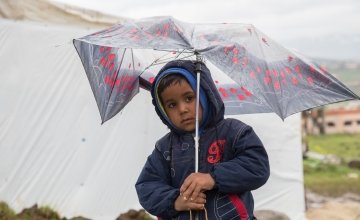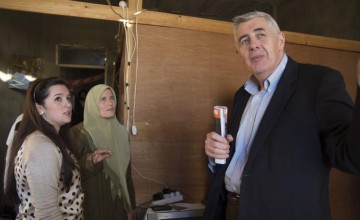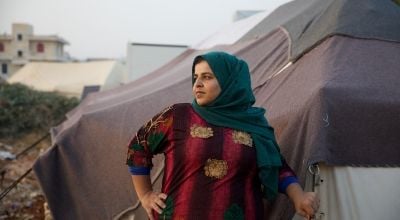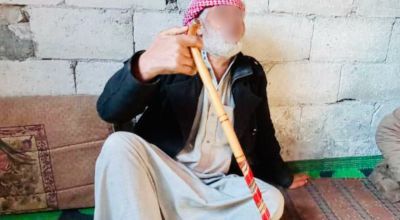
Read our 2024 annual report

Knowledge Hub
Syrian refugee crisis: update from Lebanon

Syrians in Lebanon are making compromises nobody should have to make, just to survive. Find out how you can help.
The recent Paris attacks unmasked the harsh reality that the Syrian crisis has spread far beyond the borders of the Middle Eastern country and into Europe. Just the day before the atrocities in Paris, bomb blasts in Lebanon’s capital, Beirut, were a brutal reminder of the instability that the Syrian civil war has sown in its surrounding countries too.
Lebanon alone is home to 1.2 million refugees who have fled the conflict in Syria. Some have been here for more than four years now, and their outlook is becoming increasingly desperate.
Aid shortfalls
Last year, huge aid shortfalls meant that the World Food Programme had to decrease the amount and value of the food vouchers – a vital lifeline for many – it could offer.
This year, with increased public attention on Syria’s refugee crisis, humanitarian funding has increased. And yet, only 50% of the funds that Syrians in Lebanon need to survive has been met.
Lebanon’s refugees are 20% poorer than they were this time last year. This shortfall will be felt most sharply in winter, as the haphazard shelter that many refugees are living in begins to feel the brunt of Lebanon’s harsh winter.
Survival
It is not yet impossible for Syrian families to survive – unfortunately, to do so means making compromises that nobody should have to make.
One basic method for survival is to cut back on already-insufficient meals. More desperately, child labour is on the increase and there is an unspoken rise in the practice of ‘survival sex’.
Girls are marrying in their adolescence in the hope of supporting their families – an option no young woman should be faced with. Furthermore, increasing rent means that refugees are falling further and further into debt.

Concern Worldwide CEO, Dominic MacSorley, recently visited Lebanon – he describes the situation:
"The challenge here is almost invisible. There are no long queues of refugees, there are no big refugee camps.
"But there are 1.2 million Syrian refugees scattered among basements, under plastic sheeting, in half completed garages.
"We have to have a much more robust response so that we can enable people to have enough to eat, proper shelter to survive the winter, and create the conditions where they can work and rebuild their own lives.
"Concern is reaching over 140,000 refugees in over 155 sites in northern Lebanon. These programmes include providing psychosocial support and providing shelter for more than 14,500 refugees.
"We are also improving the water, sanitation, and hygiene conditions for both refugees and locals. Additionally, we are helping 1,850 children gain access to education in the hope of safeguarding their future."
You can help
While there is a focus on refugees entering Europe in the media, the situation of the Syrian refugees in Lebanon has been deteriorating over the past years.
They haven’t given up hope, but there is growing desperation. With winter approaching we must re-double our efforts to make sure that those living in already difficult circumstances are not fighting just to survive.
With your support we can provide emergency kits to families to help them through the winter – donate to Syrian refugees today.





